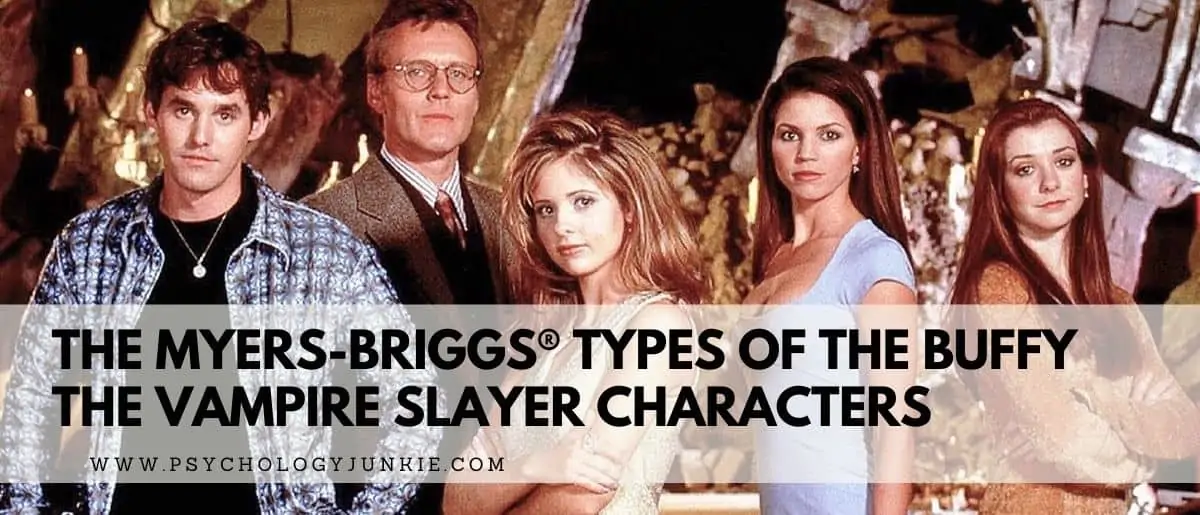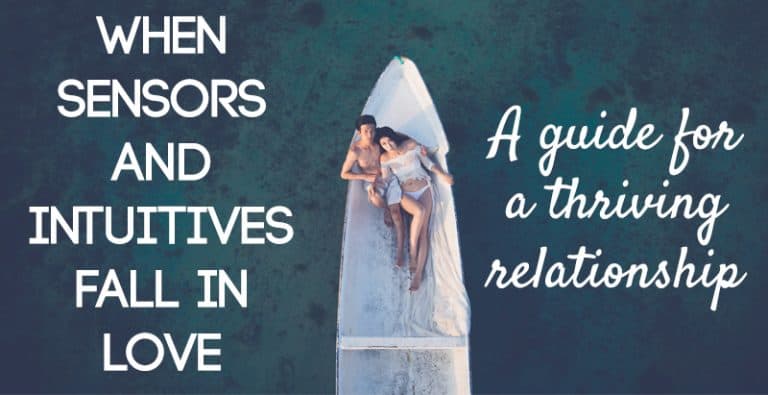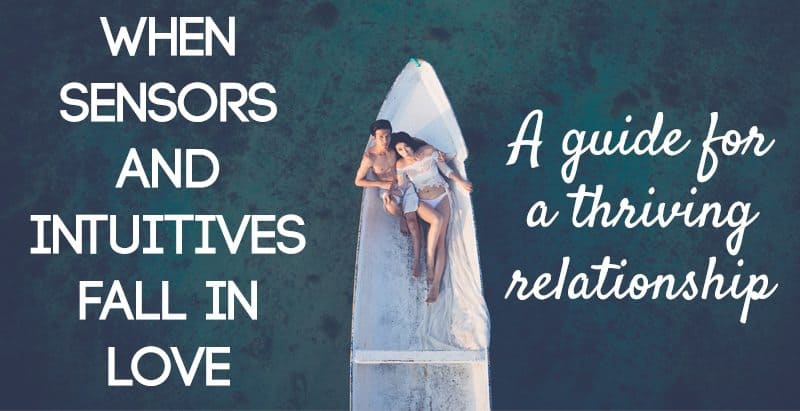The Myers-Briggs® Types of the Buffy the Vampire Slayer Characters
Ever wondered which “Buffy” character has your Myers-Briggs® personality type? While not every type is represented in the show, I hope you’ll enjoy reading up on your favorite characters either way!
Not sure what your personality type is? Take our new personality questionnaire here. Or you can take the official MBTI® here.

Table of contents
Estimated reading time: 18 minutes
The Myers-Briggs® Types of the Buffy the Vampire Slayer Characters
Buffy Anne Summers (ESFP)

Angelus: “That’s everything, huh? No weapons, no friends, no hope. Take all that away, and what’s left?”
[Angelus attempts to stab Buffy with his sword. Buffy stops it.]Buffy: “Me.”
–Buffy The Vampire Slayer, “Becoming (Part 2),” S2 E22
Buffy Summers has a strong kinesthetic ability paired with a deep-seated awareness of the importance of her relational bonds. Buffy easily manipulates the physical environment to her liking and appears at her best when she has to improvise in the moment, both while fighting vampires and solving social disputes. This vampire slayer trusts herself far more than fate. When Buffy’s mentor Giles tells her that the prophesies reveal her upcoming death, she refuses to accept it. She asserts that she will “make” her circumstances different. So long as Buffy can throw herself into the fray of her problems, she knows she will overcome every obstacle. Although Buffy is quite bold and strong-willed, she also has a soft inner world of feeling she shares only after a fair time of reflection. Although her “go-to” emotion is aggression, her care for others runs deep. While some might believe having attachments are a detriment to a warrior, she uses her love for the individuals she has chosen to befriend as fuel to propel her towards keeping Sunnydale safe.
*Nerd Note: Most typings I’ve seen label Buffy ESFP as well, however, I have seen ESTP and ISFP as other possible options. ESTP doesn’t seem to work as well given Buffy’s attachments are critical to her character—unlike Faith (ESTP)—and she doesn’t seem to have the Introverted Thinking ability to mechanically move herself through a problem. Buffy more so rides off of her conviction and will to throw herself at the problem to solve it in the moment. Buffy also complains about how bad she is at school (although she’s not “bad” at school given that her college entrance test scores were great—her problem is more in line with not applying herself) and often consults Willow for help. ISFP is a plausible typing given that Buffy’s dream-visions (which seem linked to Introverted Intuition) improve through the course of the series and Buffy seems to become more and more introspective as time moves on. However, Buffy’s clearest skill set and what she relies on most is Extroverted Sensing, and given the vast amount of trauma she has had to work through, it’s understandable that a person would withdraw from people over time after experiencing so much death. It’s not necessarily personality-contingent.
Rupert Giles (INFJ)

Buffy: “You must be so disappointed in me.”
[…]Giles: “No…If it’s guilt you’re looking for, Buffy, I’m not your man. All you will get from me is my support and my respect.”
–Buffy The Vampire Slayer, “Innocence,” S2 E14
Rupert Giles has particular strengths in finding archetypal material that assists the present moment as well as deescalating emotionally-charged environments. Giles takes his role as Buffy’s Watcher seriously, dedicating his time towards reading vast amounts of supernatural history that will assist Buffy in her fights with a range of demons. Though Giles tries to train Buffy in her physical readiness for vampires and other supernatural beings, her kinesthetic ability far surpasses his from the start and he isn’t much help in that regard. However, as Buffy begins to have prophetic (and “falsely” prophetic) dreams and worries about their origin, Giles steps in and helps her tease apart their relevance. Time after time, Giles gently guides Buffy through moments where her emotions spike from her high-stress life. He generally acts as the approachable, contemplative, intellectual father-figure of the group, guiding the students in his care towards different materials that he knows will help them grow into more evolved individuals.
*Nerd Note: I have seen Giles primarily typed INTJ, followed by ISTJ. ISTJ seems “easy” to rule out in that Giles does not have a memory that is naturally attuned towards details—unlike Willow, who tends to “fill in” facts for Giles. Giles is more of a conceptual thinker who links the present moment towards overarching stories, which is quite common in dominant Introverted Intuition. INTJ is a fair enough typing, however, Giles doesn’t seem to know what an “effective” process is, which is readily displayed when Wesley Wyndam-Pryce (ISTJ) comes to “replace” him in season three. Wesley rattles off a vast storage of specific information in the time it takes Giles to pick up a book. Wesley also has a tendency towards running through the process the group should take for the best results. Giles doesn’t work like this. Every time a new demon comes to Sunnydale, Giles simply tells everyone to “start looking” with a pointed hand towards a general direction. Extroverted Thinking requires some sort of procedural process which Giles appears to be sorely lacking. Giles is also consistently at odds with the Watchers Council, because of their lack of consideration for Buffy’s feelings, despite custom enforcing certain rituals on the slayer. Giles shows ample consideration for how Buffy is handling both her role as a slayer and as a human being with various social roles (daughter, friend, girlfriend, etc). The Council (and other slayers) brings up how odd it is for a slayer to have a social life alongside her duty, which Giles has “allowed” as per his judgment. Although this allowance has cost Buffy major losses as well as put her friends in danger, Giles wants Buffy to have as normal of a life as she can.
**Super Nerd Note: I see a likeness between Remus Lupin (Harry Potter), Atticus Finch (To Kill a Mocking Bird), Vision (The Avengers), and Rupert Giles, all of whom I would type INFJ.
Willow Rosenberg (ISFJ)

Willow (to Buffy): “I mean, you’ve been fighting evil here for three years. And I’ve helped some. And now we’re supposed to decide what we want to do with our lives. And I just realized that’s what I want to do: fight evil, help people. I mean, I think it’s worth doing. And I don’t think you do it because you have to. It’s a good fight, Buffy, and I want in.”
–Buffy The Vampire Slayer, “Choices,” S3 E19
Willow Rosenberg is innately warm, studious, curious, and more than willing to help her friends when they find themselves in danger. When she sets her mind to something, she goes all-in to learning everything she can incrementally, book by book. Willow takes the time to study and observe witchcraft before she tries it, even learning methods from Jenny Calendar before her death. Willow notes her more passive tendencies and tries to assert herself more explicitly as the series progresses, but she is always hyper aware of how she might be coming off to other people and doesn’t want to hurt them which in turn hurts herself. There is an entire episode where Willow laments how reliable she is and how people use that to give her more work than everyone else. However, it’s Willow’s reliability and knack for details that helps Giles “rejog” his memory in order to help Buffy. Willow is often the group member who relays specific factoids to the group while Giles often has to peer back at a range of information trying to find his place. Willow’s teachers generally find her to be a willing student, exemplified by the fact she gets into several top colleges. It’s not for her general smarts, but for her substantial effort. She complains to Buffy about being up doing homework all night countless times. Willow cares just as much about meeting the standards around her as the people she cares about. Though Willow is generally warm and approachable, she seems a bit lost when others don’t state what they are actually feeling. When Buffy has the temporary ability to read minds, Willow becomes jealous that Buffy is able to hear the thoughts of her boyfriend Oz. Oz doesn’t show his emotions very often and Willow wants to know what goes on in his mind and heart. Willow needs the emotional expression of her counterpart to understand how they feel and how to respond.
*Nerd Note: Most typings label Willow INFP. There could be a case for this if we take in some details, but it doesn’t seem to work holistically. It’s fairly clear that Willow is Ne-Si (Extraverted Intuition and Introverted Sensing) valuing, given her general humor style, her collection of specifics, her curiosity towards possibility, and her preference for following the same routines. It’s also pretty clear that Willow is a feeling type, which leaves INFP vs ISFJ. Willow’s style is quite quirky, as INFPs are reported to be and ISFJs aren’t reported to be (for some reason). She does get into witchcraft, which is stereotypically more of an NF-seeming pursuit. However, the points for INFP seem to stop there. I don’t see dominant Introverted Feeling in Willow. Every time Willow “asserts herself” she says sorry if the others show their hurt, even with a slight (visual) expression. Willow has to work herself up to speak openly about how others have let her down, but she will backtrack the moment someone else is hurt by what she perceives to be true. I don’t typically see this behavior in Introverted Feeling dominants, who stand by their convictions firmly. Extroverted Feeling can’t help but cater to the outer sphere. As explained above, Willow is quite frustrated by Oz’s seeming apathy, because she wants to know how he feels and yet he never shows it. An INFP with strong FiNe doesn’t “need” to see someone’s emotional affect to know what their intent is, an ISFJ does. In general: INFPs pierce deeply, ISFJs nurture what is seen. Willow also has a tendency of knowing when something is “off” with someone because their custom emotional affect and trackable habits are “off.” Willow relies on outer context to determine how someone feels. If we add in the fact of Willow’s general “what if ___ goes wrong, or ___, or ____, or ___” line of questioning that happens every few episodes (a common feature of inferior Extroverted Intuition), there generally seems to be much more evidence in favor of ISFJ.
Xander Harris (ENTP)

Xander: “Yeah, I’m going to have to go with Dead Boy on this one.”
Angel: “Could you not call me that.”
–Buffy The Vampire Slayer, “Lie to Me,” S2 E7
Xander Harris is quick-witted and willing to challenge conclusions made by others in the group. He has a tendency towards making a joke of every situation, which most visibly appears to bother Giles given the life and death nature of slaying. Many of Xander’s observations are “telling,” however, the group rarely has the patience to divulge his every thought—thoughts being something he has near endless amounts of. Where Oz carries a mystique for his quiet, reflective nature, Xander carries an assurance that you will know his opinion the moment he has one. Xander is gifted in oration, but is often surprised when people give him the time of day because of it (much like Ampata the Inca mummy did). Xander generally has a tendency of being unaware of how his actions will emotionally affect the people around him. Although Xander knew Willow had unrequited feelings towards him, that didn’t stop him from pursuing Buffy right in front of her. Later in the series, Xander and Willow kiss despite them both having partners. Xander (and to be fair, Willow in this moment) doesn’t show much self-control when it comes to his present mood. Of all the characters, Xander seems most unsettled in what he wants, hopping from one idea to the next just as quickly as he hops from one potential partner to the next. Although Xander has a bit to learn where romance is concerned, he does make himself available for whatever the group needs, including the occasional doughnut run.
*Nerd Note: I’ve also seen Xander typed ENFP, but it doesn’t seem as prevalent. Xander would need to have a greater understanding of his effect on people to have auxiliary Introverted Feeling. His consistent problem throughout the series is how he lets down his relational bonds through his coarse choices. Xander is rather playful and approachable, but he seems to have more conviction towards what he believes to be true rather than who he attaches himself to. His willingness to call upon a witch to “rewrite the script” so that he can break up with Cordelia and she can be the laughing stock instead of himself is just one example of his lack of compassion that has yet to develop.
Cordelia Chase (ESTJ)

Cordelia: “So Angel has decided to step up his harassment [of Buffy ]…by sneaking in her room and leaving stuff at night? Why doesn’t he just slit her throat or strangle her while she’s sleeping or cut her heart out?”
[The group gives her a look.]Cordelia: “What? I’m trying to help.”
–Buffy The Vampire Slayer, “Passion,” S2 E17
Cordelia Chase is sharp, intelligent, bold, and to the point. Much like Xander, she says whatever comes to mind without a filter. However, unlike Xander, everything she says applies to the direct needs of the moment. In an episode of Angel (a Buffy spinoff), Cordelia even states, “I think it. I say it. It’s my way.” Cordelia has strong leadership qualities and has taken over for Buffy in times where her powers weren’t working. Cordelia is a great student given her thoroughness and is also concerned with being popular within the school hierarchy. Much like Xander, Cordelia’s problems lay within her relational skills. When Xander gives Cordelia a necklace for Valentine’s Day she wears it concealed under her clothing. When Xander asks for it back due to break up, Cordelia tells Xander it’s in her locker when truly, she had been wearing it around her neck since the moment he gave it to her. She refuses to let him or anyone else know what the gift meant to her. Cordelia showcases a repeated pattern of things meaning a great deal to her and her not allowing others into it for fear they will use that against her. Cordelia’s emotional realm is private and fairly sensitive. She is quick to take necessary, bold steps to complete a task in the most effective way possible, but when it comes to her heart, her insecurity blossoms.
*Nerd Note: I’ve also seen Cordelia typed ESFJ. I don’t see Cordelia use Extroverted Feeling much at all, apart from short-lived almost façade versions of it. The group has to remind Cordelia to take others feelings into consideration before she speaks on a regular basis. It becomes “expected” that Cordelia will say something rude, even if she is simply trying to help someone. Cordelia also isn’t insecure about what she thinks. She has no problem challenging Buffy, Giles, Xander, or literal demons on their logic when their actions don’t apply to the real-world. Cordelia is quite concerned with remaining high on the social hierarchy, but she always questions whether people like her for her position or out of fear. Cordelia can turn on her charm—as seen when Wesley Wyndam-Pryce (ISTJ) takes over as Watcher for a short period of time—but these bursts are short lived and are meant to produce an outcome, not harmonize group feeling.
Daniel Osbourne – “Oz” (INTP)

Willow: “Do you want to make out with me?”
Oz: “What?”
Willow: “Forget it. I’m sorry…Well, do you?”
Oz: “Sometimes when I’m sitting in class…you know, I’m not thinking about class, because that would never happen. I think about kissing you. And it’s like everything stops. It’s like, it’s like freeze-frame. Willow kissage. Oh, I’m not going to kiss you.”
Willow: “What? But freeze-frame!”
Oz: “Well, to the casual observer, it would appear that you’re trying to make your friend Xander jealous or even the score or something. And that’s on the empty side. See, in my fantasy when I’m kissing you, you’re kissing me. It’s okay, I can wait.”
–Buffy The Vampire Slayer, “Innocence,” S2 E14
Oz is quiet, intelligent, a bit stoic, and a keen observer. He doesn’t say much in group settings, but when he does, everyone listens. Oz is rather philosophical within himself. When Buffy gains the ability to read minds in the episode “Earshot” Oz thinks, “I am my thoughts. If they exist in her, Buffy contains everything that is me, and she becomes me.” In this same episode Willow expresses concern that Buffy gets to know what Oz is thinking, but she never does. Oz is not emotionally expressive and keeps his face (unintentionally) flat during conversations. Xander jokes that he’s just waiting for Oz to show some kind of excitement at any given moment, but Oz doesn’t. When Willow is taken captive by Faith and the Mayor in season three, Oz says nothing but throws a vase at a wall. It shatters. Everyone knows they have to do something to get her back as even Oz is reacting strongly. Oz generally isn’t much of a people person, but he notices Willow the moment he catches sight of her and seems to commit to her before they meet. Few people stand out to Oz enough for him to invest effort in them, but Willow somehow does. Oz generally has this certain “laziness” wherein he refuses to do classwork because he’s far beyond it intelligence-wise, which ironically causes him to not graduate. He is quite apathetic towards much of what he witnesses happen, although it’s clear that he cares about the group and playing guitar with his band.
*Nerd Note: INTP seems the solid victor from what I’ve seen. The only other type I would consider would be ISTP, but Extroverted Sensing auxiliary tends to be much more proactive and assertive than Oz is. Oz is generally quite passive unless substantially prompted.
Angel (ISFP)

Angel (to Buffy): “I hated hurting you. It cut me deeper than I’ve ever been cut. More than I can stand… in 243 years I’ve loved exactly one person.”
–Buffy The Vampire Slayer, “Earshot,” S3 E18
Angel is considerate, loyal, and dedicated to his bonds. He can jump into the fray to protect those he cares about with ease, but oftentimes lingers in the shadows just making sure Buffy, in particular, is okay. Angel is individualistic in the sense that he lives away from all other vampires and makes a point to not kill humans in order to feed. Angel instead visits the butcher shop every so often for his meals. He is a “unique” vampire in the sense that he has a soul. Angel must live with the deaths he once caused as Angelus (his soulless vampire self ‘Angelus’) every day, which causes his demeanor to be a bit brooding. Shame colors much of his waking life. He lives in a perpetual state of knowing he has targeted innocent people in the past, first making them insane and then killing them. This knowledge burdens him. As ‘Angel,’ he has a strong conviction to not harm unless it’s needed. Angel does have some long-range thinking compacity as he initiates the breakup with Buffy in season three once both the major and Buffy’s mother relay cold facts: vampires and humans can’t have effective long-term relationships. A dream follows that supports their conclusion. Angel realizes that the future ahead of the couple isn’t fair to Buffy. Angel removes himself from Buffy so that she might live a better life without him.
*Nerd Note: I’ve seen Angel typed ISFP, INTJ, and ISFJ. INTJ doesn’t seem to flow as Angel’s ambition throughout the series is motivated by a strong feeling judgment. An INTJ also probably would have been able to anticipate the arising problems between a vampire and human romance before engaging in one. A combination of Introverted Intuition and Extroverted Thinking provides someone with the ability to shoot for the best possibility with the most gain. Would a several hundred-year-old vampire with such knowledge involve himself with a teenage girl who is literally being bred to kill his kind? Probably not. (Hopefully not. Love is weird. I will give you that.) For the ISFJ case, I considered this type as well. Angel seems rather close to his past. Angel, for example, gives Buffy a claddagh ring and explains its significance based on the Irish culture he grew up in. His intention seems to be to share a part of himself with Buffy, which she takes on quite readily. Although Angel is relatively approachable until a need to be otherwise occurs, he doesn’t exude much when it comes to shifts in emotion. If we compare Angel to Willow, there’s a clear differentiation between how Extroverted Feeling and Introverted Feeling exerts itself. Namely, we as an audience generally know what Willow is feeling at all times. She lives within her feeling states. When it comes to Angel, however, we don’t. All we really know is that he’s quiet, reflecting, and very into Buffy. It’s an underlying scheme rather than a moment-by-moment emotional update. Buffy is actually the person who pressures Angel into extroverting his emotions when her own insecurity around their relationship flares. Angel believes it’s “clear” how he feels. It probably is, from within his own heart.
What Are Your Thoughts?
Did you enjoy this article? Do you have any thoughts on the types of these characters? Let us know in the comments!
Find out more about your personality type in our eBooks, Discovering You: Unlocking the Power of Personality Type, The INFJ – Understanding the Mystic, The INTJ – Understanding the Strategist, and The INFP – Understanding the Dreamer.
About the Author:
 Jami Cannon is an ISFJ MBTI® enthusiast who hopes to shed more light on the SJ experience. She holds a very stereotypical degree in History (MA) and loves to learn all she can about the people around her. [/caption]
Jami Cannon is an ISFJ MBTI® enthusiast who hopes to shed more light on the SJ experience. She holds a very stereotypical degree in History (MA) and loves to learn all she can about the people around her. [/caption]













Could you type the male antagonists of Buffy The Vampire Slayer please? The male antagonist of season one, season two, season three, season four, season six and season seven.
Another great article, Jami! Loved your analysis of the characters and it fits well from what I know of the show. 🙂